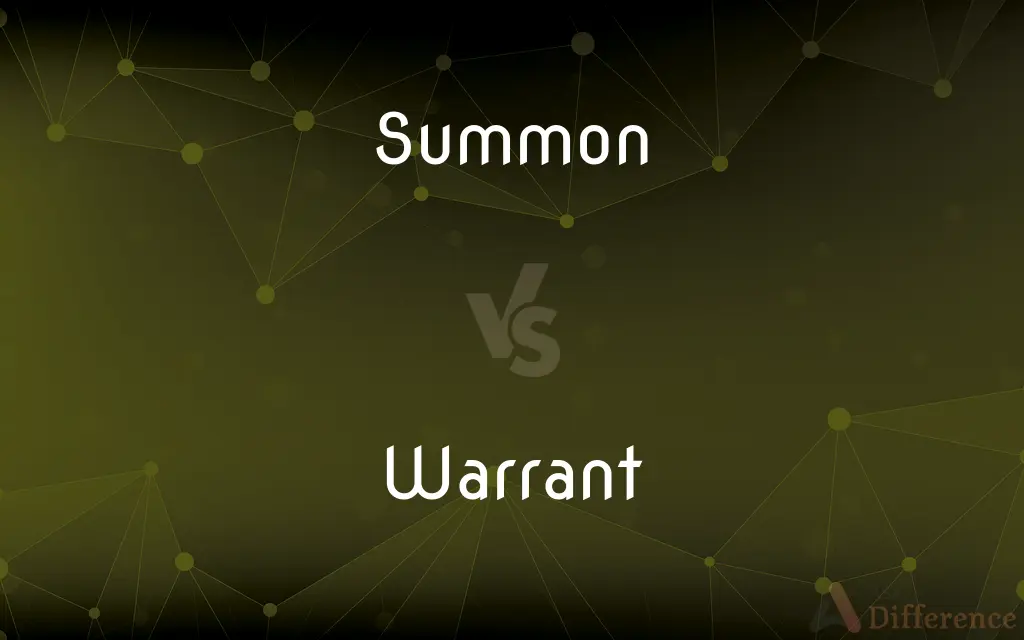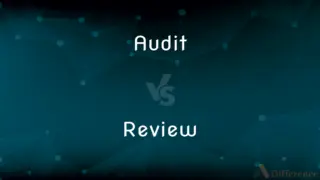Summon vs. Warrant — What's the Difference?
By Tayyaba Rehman — Updated on September 19, 2023
A summon is an order to appear before a court or a person, while a warrant is a legal document authorizing actions such as arrests or property searches. Both are legal instruments but serve distinct purposes.

Difference Between Summon and Warrant
Table of Contents
ADVERTISEMENT
Key Differences
The legal landscapes use various instruments to uphold the law, and among these tools are the summon and warrant. A summon generally refers to an authoritative call or order for someone to appear before a court or another official body. In contrast, a warrant typically is a written authorization allowing specific actions, like the arrest of an individual or a search of premises.
Delving deeper, when an individual receives a summon, they are legally bound to appear before a certain authority at a designated time. Failure to adhere can lead to further legal consequences. In the realm of warrants, they provide law enforcement officers with the authority to, for example, arrest someone believed to have committed a crime, or search a particular location for evidence.
In essence, a summon is more of a request for presence, while a warrant is an empowerment for action. When a court issues a summon, it doesn't grant anyone the power to detain or arrest. It simply requests the presence of the concerned person. In the case of a warrant, however, it directly grants specific powers to execute the actions mentioned therein.
While both summon and warrant are rooted deeply within the legal system, they arise from different needs. A summon is often a preliminary step in legal proceedings, ensuring all parties are present for hearings or trials. A warrant, conversely, usually stems from an investigative need, allowing law enforcement to make arrests or collect evidence.
Comparison Chart
Definition
An order to appear before a court or person.
A written authorization for specific actions.
ADVERTISEMENT
Nature
Request for presence.
Empowerment for action.
Consequence
Does not authorize arrest.
Authorizes actions like arrests or searches.
Typical Use
Preliminary step in legal proceedings.
Arises from investigative needs.
Result of Non-compliance
Can lead to further legal actions.
Immediate legal consequences like arrest.
Compare with Definitions
Summon
An authoritative order to appear before a court or person.
She received a summon to appear in court next week.
Warrant
A legal document authorizing certain actions.
The detective had a warrant to search the suspect's house.
Summon
A call or signal indicating the need for action.
The fire alarm acted as a summon for evacuation.
Warrant
A document issued by a legal or government official authorizing the police or another body to make an arrest, search premises, or carry out some other action relating to the administration of justice
An extradition warrant
Magistrates issued a warrant for his arrest
Summon
An act of invoking or calling upon a spirit or deity.
Ancient rituals often involved a summon of spirits.
Warrant
Justification or authority for an action, belief, or feeling
There is no warrant for this assumption
Summon
A signal prompting action or attention.
The loud horn was a summon for help.
Warrant
An official certificate of appointment issued to an officer of lower rank than a commissioned officer.
Summon
A request for someone to attend a particular place.
The principal sent a summon for the student to his office.
Warrant
Justify or necessitate (a course of action)
The employees feel that industrial action is warranted
Summon
To call together; convene
Summon a meeting of officials.
Warrant
Officially affirm or guarantee
The vendor warrants the accuracy of the report
Summon
To request to appear; send for
Summon a doctor to help an injured man.
Warrant
(Law) A judicial writ authorizing the search or seizure of property, arrest of a person, or the execution of a legal judgment.
Summon
To order to take a specified action; bid
Summon the captain to surrender.
Warrant
A voucher authorizing payment or receipt of money.
Summon
To bring to mind or remember. Often used with up
We tried to summon up an image of our childhood friend.
Warrant
An option to buy stock at a specified price from an issuing company.
Summon
To cause one to think of (something); evoke. Often used with up:"Badly cured hippie fur ... maté, and paraffin heating oil are the scents that summon up my remembrance of the late sixties" (Judith Thurman).
Warrant
Justification for an action or a belief; grounds
"The difficulty of predicting the future is no warrant to ignore it" (Brian Hayes).
Summon
To bring into existence or readiness. Often used with up:"He summoned up a smile, though it seemed to take all his strength" (Colin Turnbull).
Warrant
Something that provides assurance or confirmation; a guarantee or proof
"The kind of uncertainties and ambiguities ... which may damage [his] essays ... are often a warrant of authenticity in [his] fiction" (John Edward Hardy).
Summon
(transitive) To call people together; to convene.
Warrant
Authorization or certification; sanction, as given by a superior.
Summon
(transitive) To ask someone to come; to send for.
Warrant
A warrant officer.
Summon
To order (goods) and have delivered
Warrant
A certificate of appointment given to a warrant officer.
Summon
(transitive) To rouse oneself to exert a skill.
Warrant
To provide adequate grounds for; justify or require
What could he have done that would warrant such a punishment?.
Summon
To call a resource by magic.
Warrant
To guarantee (a product).
Summon
To summons; convene.
Warrant
To guarantee (a purchaser) indemnification against damage or loss.
Summon
To impose such a fine or penalty, or to issue a notice thereof.
The police summoned the driver for speeding.
They kena summoned for littering.
Warrant
(Law) To guarantee clear title to (real property).
Summon
(video games) A creature magically summoned to do the summoner's bidding.
Warrant
Authorization or certification; a sanction, as given by a superior.
Summon
Call, command, order en
Warrant
(countable) Something that provides assurance or confirmation; a guarantee or proof.
A warrant of authenticity; a warrant for success
Summon
A fine; a fee or monetary penalty incurred for breaking the law; usually for a minor offence such as a traffic violation.
You better pay off the parking summon tomorrow before you kena interest on it.
Warrant
(countable) An order that serves as authorization; especially a voucher authorizing payment or receipt of money.
Summon
A notice of an infringement of the law, usually incurring such a penalty; a citation or ticket.
Warrant
An option, usually issued together with another security and with a term at issue greater than a year, to buy other securities of the issuer.
Summon
To call, bid, or cite; to notify to come to appear; - often with up.
Stiffen the sinews, summon up the blood.
Trumpets summon him to war.
Warrant
A judicial writ authorizing an officer to make a search, seizure, or arrest, or to execute a judgment.
An arrest warrant issued by the court
Summon
To give notice to, or command to appear, as in court; to cite by authority; as, to summon witnesses.
Warrant
(countable) A certificate of appointment given to a warrant officer.
Summon
To call upon to surrender, as a fort.
Warrant
A document certifying that a motor vehicle meets certain standards of mechanical soundness and safety; a warrant of fitness.
Summon
Call in an official matter, such as to attend court
Warrant
A defender, a protector.
Summon
Ask to come;
Summon a lawyer
Warrant
Underclay in a coal mine.
Warren earth
Summon
Gather or bring together;
Muster the courage to do something
She rallied her intellect
Summon all your courage
Warrant
To protect, keep safe (from danger).
Summon
Make ready for action or use;
Marshal resources
Warrant
To give (someone) an assurance or guarantee (of something); also, with a double object: to guarantee (someone something).
Warrant
(transitive) To guarantee (something) to be (of a specified quality, value, etc.).
Warrant
(transitive) To guarantee as being true; (colloquially) to believe strongly.
That tree is going to fall, I’ll warrant.
Warrant
(transitive) To authorize; to give (someone) sanction or warrant (to do something).
I am warranted to search these premises fully.
Warrant
(transitive) To justify; to give grounds for.
Circumstances arose that warranted the use of lethal force.
Warrant
That which warrants or authorizes; a commission giving authority, or justifying the doing of anything; an act, instrument, or obligation, by which one person authorizes another to do something which he has not otherwise a right to do; an act or instrument investing one with a right or authority, and thus securing him from loss or damage; commission; authority.
Warrant
A writing which authorizes a person to receive money or other thing.
Warrant
That which vouches or insures for anything; guaranty; security.
I give thee warrant of thy place.
His worth is warrant for his welcome hither.
Warrant
A precept issued by a magistrate authorizing an officer to make an arrest, a seizure, or a search, or do other acts incident to the administration of justice.
Warrant
That which attests or proves; a voucher.
Warrant
An official certificate of appointment issued to an officer of lower rank than a commissioned officer. See Warrant officer, below.
Warrant
Right; legality; allowance.
Warrant
To make secure; to give assurance against harm; to guarantee safety to; to give authority or power to do, or forbear to do, anything by which the person authorized is secured, or saved harmless, from any loss or damage by his action.
That show I first my body to warrant.
I'll warrant him from drowning.
In a placeLess warranted than this, or less secure,I can not be.
Warrant
To support by authority or proof; to justify; to maintain; to sanction; as, reason warrants it.
True fortitude is seen in great exploits,That justice warrants, and that wisdom guides.
How little while it is since he went forth out of his study, - chewing a Hebrew text of Scripture in his mouth, I warrant.
Warrant
To give a warrant or warranty to; to assure as if by giving a warrant to.
[My neck is] as smooth as silk, I warrant ye.
Warrant
To secure to, as a grantee, an estate granted; to assure.
Warrant
A writ from a court commanding police to perform specified acts
Warrant
A type of security issued by a corporation (usually together with a bond or preferred stock) that gives the holder the right to purchase a certain amount of common stock at a stated price;
As a sweetener they offered warrants along with the fixed-income securities
Warrant
Formal and explicit approval;
A Democrat usually gets the union's endorsement
Warrant
A written assurance that some product or service will be provided or will meet certain specifications
Warrant
Show to be reasonable or provide adequate ground for;
The emergency does not warrant all of us buying guns
The end justifies the means
Warrant
Stand behind and guarantee the quality, accuracy, or condition of;
The dealer warrants all the cars he sells
I warrant this information
Warrant
A justification or reason for an action or belief.
His behavior gave no warrant for such harsh criticism.
Warrant
An assurance of the quality or durability of a product.
The new phone comes with a one-year warranty.
Warrant
A document entitling the holder to receive stocks.
He held warrants that would convert to shares upon execution.
Warrant
A pledge of assurance or authority.
The badge served as his warrant in the investigation.
Common Curiosities
Can a law enforcement officer arrest someone with just a summon?
No, a summon does not authorize arrest; it requests an appearance.
What happens if someone ignores a summon?
Ignoring a summon can lead to further legal consequences, including potential warrants.
What is the primary purpose of a summon?
A summon is mainly an order for someone to appear before a court or another authority.
What actions can a warrant authorize?
A warrant can authorize actions like arrests, searches, or seizures.
Does every police search require a warrant?
No, searches under certain circumstances, like exigent situations or with consent, don't require a warrant.
What is the basis for issuing a warrant?
A warrant is typically issued based on probable cause or substantial evidence.
How long is a warrant valid?
The validity of a warrant varies based on jurisdiction, but it typically remains valid until executed or quashed by a court.
Can a summon be issued for reasons other than court appearances?
Yes, a summon can also be a call or signal for action or attendance in specific contexts.
Is a summon the same as a subpoena?
While similar, a subpoena is specifically a written order to attend a court proceeding or produce evidence.
Can anyone request a warrant?
No, warrants are typically requested by law enforcement and issued by judges or magistrates.
Share Your Discovery

Previous Comparison
Audit vs. Review
Next Comparison
Honesty vs. IntegrityAuthor Spotlight
Written by
Tayyaba RehmanTayyaba Rehman is a distinguished writer, currently serving as a primary contributor to askdifference.com. As a researcher in semantics and etymology, Tayyaba's passion for the complexity of languages and their distinctions has found a perfect home on the platform. Tayyaba delves into the intricacies of language, distinguishing between commonly confused words and phrases, thereby providing clarity for readers worldwide.
















































